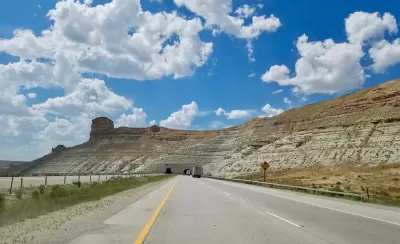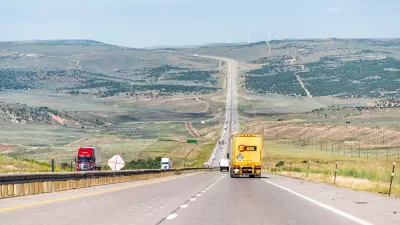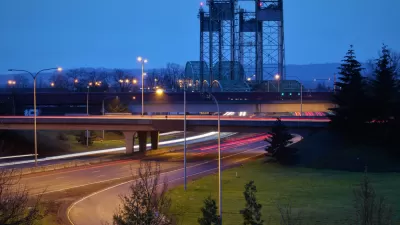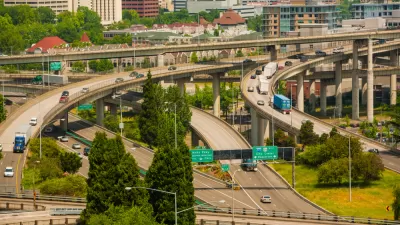Over the objections of the oil and trucking industries, an interim committee voted to allow the Wyoming legislature to determine whether to toll all lanes on Interstate 80 due to a shortfall in the state transportation budget.

Ramsey Scott, the Wyoming Tribune Eagle's state government reporter, via Wyoming News Exchange.
While the proposed legislation won approval Tuesday, that slim margin is indicative of the potential struggle awaiting it in 2020. Both the Wyoming Trucking Association and the Wyoming Petroleum Marketers Association testified against the bill as an unfair burden on the transportation industry, and said it will push drivers to alternative routes and cost businesses along the I-80 corridor money.
Committee co-chairman Sen. Michael Von Flatern, R-Gillette, has been a major proponent of tolling I-80 and said Wyoming has already spent years studying the issue. Instead, the Legislature should start to act on putting into motion a viable way to pay for infrastructure needs along I-80.
Transportation budget shortfall for I-80
According to Scott, "Wyoming first studied the idea of tolling I-80 back in 2008 and 2009, but the Legislature shelved that study and its recommendations in 2010. [Wyoming Department of Transportation] WYDOT again studied the issue in 2017, as one of several options to make up a growing deficit in highway maintenance funding."
As for the costs to maintain the interstate, "Shelby Carlson, chief engineer at WYDOT, said as of now, Wyoming spends about $60 million a year...but would need an additional $41.5 million to keep it in its current state."
The uphill road to tolling interstates
Due to the decision to finance the 1956 Interstate Highway Act with gas taxes rather than tolls, there exists a general prohibition on the imposition of tolls on existing interstate highways (pre-existing tolls were 'grandfathered', such as stretches of I-80 in Illinois, Indiana and Ohio). States must apply to the Federal Highway Administration (FHWA) for a waiver under four possible tolling programs.
Should the tolling legislation pass next year, WYDOT would likely apply for a waiver under the Interstate System Reconstruction and Rehabilitation Pilot Program to "fund needed reconstruction or rehabilitation on Interstate corridors that could not otherwise be adequately maintained or functionally improved without the collection of tolls" (per FHWA).
"While several states have applied to the Federal Highway Administration to use the program since its creation, none have actually followed through and approved a toll," adds Scott.
Do note below that Oregon applied last December under the same program and is awaiting approval, which appears "likely," and that Rhode Island not only received approval, though under a different tolling program, has been tolling heavy-duty trucks for almost a year.
Other states' attempts at interstate tolling
- Pennsylvania: One of the first attempts at tolling an existing interstate also occurred on I-80, about 1,500 miles with the passage of Act 44 by the Pennsylvania General Assembly and signed by Gov. Ed Rendell in July 2007. It directed the Pennsylvania Turnpike Commission (PTC) and PennDOT to apply for a waiver under the same pilot program. The opposition was so strong that federal legislation, ultimately unsuccessful, was introduced by two Pennsylvania congressmen to ensure "freeways remain free" According to the PTC's Act 44 webpage:
In April 2010, FHWA denied Pennsylvania’s application to toll I-80. The FHWA interpretation of the Section 129 General Tolling Program is that the lease payments as proposed were inconsistent with the statutory requirements of the program. Specifically, the lease would have the effect of diverting toll revenues collected from the operation of I-80 to projects on other roads.
-
Oregon: Last December, the Oregon Department of Transportation, authorized by gas tax legislation that passed in 2017, applied to the FHWA for a tolling prohibition waiver under the Value Pricing Pilot Program to toll all lanes on a stretch of Interstate 5 in the Portland metro area.
It also applied for a tolling prohibition waiver and under the ISRRP Program "to toll all lanes on or near the Abernethy Bridge on I-205 to raise revenue for a new or seismically retrofitted bridge at the Clackamas County chokepoint," reported Andrew Theen of The Oregonian on Jan. 10. "[T]he Federal Highway Administration said [on Jan. 8] both tolling proposals are 'likely eligible' to move forward."
-
Virginia: Last January, it appeared that Virginia would support tolling for the I-81 Corridor Improvement Project but settled in April on a new regional fuel tax and increasing user fees for trucks.
-
Wisconsin: Republican legislators prefer tolling over increasing the state's 32.9 cents per gallon gas tax, but Democratic Gov. Tony Evers wants an 8-CPG gas tax increase.
-
Indiana: Successful legislation in 2017 that increased the gas tax by 10-cents per gallon also required the Indiana Department of Transportation to study tolling to fund interstate improvements, likely on I-65 and I-70. WIBC reported on Nov. 29, 2018, that "Governor Holcomb [R] says in a letter to legislators that between last year's gas tax increase and a deal this year with the company which operates the Indiana Toll Road, the state has plenty of money for road construction he won't pursue new tolls."
-
Connecticut Gov. Ned Lamont [D] wants to toll Interstates 84, 91 and 95 and the Merritt Parkway but the legislature doesn't appear receptive, according to the Hartford Courant on July 16.
-
The Rhode Island Department of Transportation's (RIDOT) unique interstate tolling program, RhodeWorks, applies only to trucks. In March, it won a court battle with the American Trucking Associations. The first two tolling gantries, both on I-95, have been in operation for almost a year. Ten more are planned along six major highway corridors, each associated with a bridge, allowing RIDOT to apply to FHWA under one of two mainstream tolling programs as RIDOT will repair or replace bridges with this revenue.
Section 129 General Tolling Program allows tolling on new highways and new lanes added to existing highways, and on the reconstruction or replacement of bridges, tunnels and existing toll facilities.
A long wait for tolls
"Even if the [Wyoming] Legislature passes the 2020 bill, it would need to vote again in 2022 on a management plan for tolling and then seek federal approval," adds Scott. "[T]he earliest the state could expect to collect tolls would be 2029."
Related in Planetizen:
-
'Keep Freeways Free' Legislation Introduced (in response to Pennsylvania legislation to toll I-80), February 24, 2009
FULL STORY: I-80 toll will be on 2020 legislative agenda

Alabama: Trump Terminates Settlements for Black Communities Harmed By Raw Sewage
Trump deemed the landmark civil rights agreement “illegal DEI and environmental justice policy.”

Planetizen Federal Action Tracker
A weekly monitor of how Trump’s orders and actions are impacting planners and planning in America.

The 120 Year Old Tiny Home Villages That Sheltered San Francisco’s Earthquake Refugees
More than a century ago, San Francisco mobilized to house thousands of residents displaced by the 1906 earthquake. Could their strategy offer a model for the present?

In Both Crashes and Crime, Public Transportation is Far Safer than Driving
Contrary to popular assumptions, public transportation has far lower crash and crime rates than automobile travel. For safer communities, improve and encourage transit travel.

Report: Zoning Reforms Should Complement Nashville’s Ambitious Transit Plan
Without reform, restrictive zoning codes will limit the impact of the city’s planned transit expansion and could exclude some of the residents who depend on transit the most.

Judge Orders Release of Frozen IRA, IIJA Funding
The decision is a victory for environmental groups who charged that freezing funds for critical infrastructure and disaster response programs caused “real and irreparable harm” to communities.
Urban Design for Planners 1: Software Tools
This six-course series explores essential urban design concepts using open source software and equips planners with the tools they need to participate fully in the urban design process.
Planning for Universal Design
Learn the tools for implementing Universal Design in planning regulations.
Clanton & Associates, Inc.
Jessamine County Fiscal Court
Institute for Housing and Urban Development Studies (IHS)
City of Grandview
Harvard GSD Executive Education
Toledo-Lucas County Plan Commissions
Salt Lake City
NYU Wagner Graduate School of Public Service





























